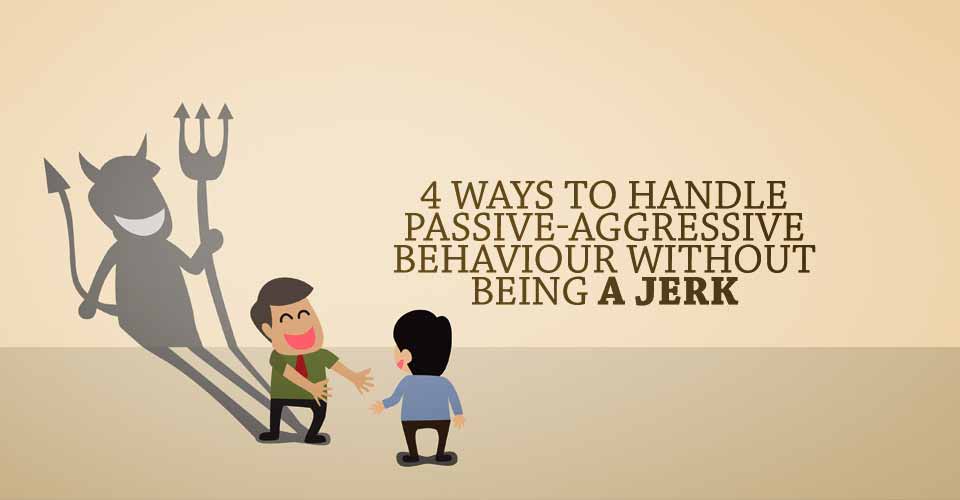Finding a way to handle passive-aggressive behavior that doesn’t make you seem like a jerk can be tricky.
You’re probably familiar with passive-aggressive behaviour, even if you don’t recognize it for what it is. It’s rampant on social media. I’m sure you’ve seen the posts and comments on Facebook that are obviously showing hostility, albeit through the veil of a smile.
“You usually look tired in your pictures, but you look nice in this one.” Jeez, thanks, aunt Judy.

Usually, the passive-aggressive person says something with a hint of rudeness to it as a response to conflict they are avoiding. Combine that with a feeling of powerlessness and helplessness, and you have the recipe for an internal power struggle that results in passive-aggressive behaviour.
I remember one instance when I was out shopping for a sweater with a co-worker of mine who was up for the same promotion I was. After making the mistake of asking her opinion on one of my selections, she responded with, “It looks like your diet might not be working. Maybe if you try a size up you’ll be more comfortable.” Said sweetly, with a smile, of course. I’m not certain she was really concerned with my health, or my level of comfort. What was really going on was she wanted me to initiate conflict so she could release her anger and frustration.
These are verbal signs of classic passive-aggressive behaviour, but there are other ways people exhibit this as well. When someone gives you the silent treatment, is intentionally late, doesn’t do what is asked of them, or withholds intimacy, they are also being passive-aggressive.
So how do we handle this type of frustrating behaviour without coming across like a jerk?
1. Stay focused on the current moment.
It’s easy to fall for the trap of bringing up all the other times they’ve acted like this, but don’t do it. Stay in the now.
So they said something that hurt your feelings or made you angry. Don’t contribute to the endless cycle of passive-aggressive behaviour by reliving the numerous other times they did the exact same thing.
Instead, focus on what they said in this instance and let them know how they made you feel. These people act like this because they are avoiding something. If you avoid the issue of their passive-aggressive behaviour, you’re only contributing to the cycle.
2. Use “I” instead of “you” when expressing yourself.
When we say things like “you do this” or “you make me feel this way” it comes off accusatory, and defense mode is engaged. You want to deflect aggression, not trigger it.
Use phrasing that incorporates the use of “I.” As in, “I feel hurt when things are said about my weight,” or “I prefer if remarks like that weren’t made.”
3. Make it clear that there are consequences for their actions.
You should probably expect them to deny ever doing anything wrong, or they’ll make excuses for their behaviour. Regardless of what tactics they try to deploy, stand your ground and respond accordingly.
If this is the third time you’ve invited John to join you and your friends for drinks, and he says yes but never shows up, then it’s time to instill some consequences. Kindly let John know that if you invite him in the future, and he says he will be there, then he needs to show up. Otherwise, someone else will be asked in his place, and he probably won’t be given much consideration for future gatherings.
4. Understand that not everyone is going to be approachable.
Sometimes we need to weigh the pros and cons of confronting this type of behaviour.
If you work for someone who is passive-aggressive towards you, it might not be as beneficial for you to confront them as it would be for you to approach your friend. There are pros and cons to everything we do. While it might feel great to finally tell your boss how you feel about his snotty remarks, it probably won’t serve you very well in the long run. If they use sarcasm and “thank you for your hard work,” then you can respond with a genuine “you’re welcome.” That’s about as good as it gets in those situations.
Overall, be mindful of how you speak to others and pay attention to what triggers your frustration and anger. Acknowledge how you feel and process that information in the healthiest way you can.



